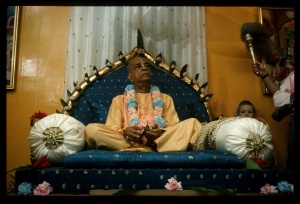CC Antya 3.150: Difference between revisions
No edit summary |
(Vanibot #0054 edit - transform synonyms into clickable links, which search similar occurrences) |
||
| Line 17: | Line 17: | ||
<div class="synonyms"> | <div class="synonyms"> | ||
''sarva-jña'' | ''[//vanipedia.org/wiki/Special:VaniSearch?s=sarva&tab=syno_o&ds=1 sarva]-[//vanipedia.org/wiki/Special:VaniSearch?s=jña&tab=syno_o&ds=1 jña]'' — omniscient; ''[//vanipedia.org/wiki/Special:VaniSearch?s=nityānanda&tab=syno_o&ds=1 nityānanda]'' — Lord Nityānanda; ''[//vanipedia.org/wiki/Special:VaniSearch?s=āilā&tab=syno_o&ds=1 āilā]'' — came; ''[//vanipedia.org/wiki/Special:VaniSearch?s=tāra&tab=syno_o&ds=1 tāra] [//vanipedia.org/wiki/Special:VaniSearch?s=ghare&tab=syno_o&ds=1 ghare]'' — at his house; ''[//vanipedia.org/wiki/Special:VaniSearch?s=āsiyā&tab=syno_o&ds=1 āsiyā]'' — coming; ''[//vanipedia.org/wiki/Special:VaniSearch?s=vasilā&tab=syno_o&ds=1 vasilā]'' — sat down; ''[//vanipedia.org/wiki/Special:VaniSearch?s=durgā&tab=syno_o&ds=1 durgā]-[//vanipedia.org/wiki/Special:VaniSearch?s=maṇḍapa&tab=syno_o&ds=1 maṇḍapa]-[//vanipedia.org/wiki/Special:VaniSearch?s=upare&tab=syno_o&ds=1 upare]'' — on the altar of the ''Durgā-maṇḍapa''. | ||
</div> | </div> | ||
Latest revision as of 20:23, 19 February 2024

His Divine Grace
A.C. Bhaktivedanta Swami Prabhupada
A.C. Bhaktivedanta Swami Prabhupada
TEXT 150
- sarvajña nityānanda āilā tāra ghare
- āsiyā vasilā durgā-maṇḍapa-upare
SYNONYMS
sarva-jña — omniscient; nityānanda — Lord Nityānanda; āilā — came; tāra ghare — at his house; āsiyā — coming; vasilā — sat down; durgā-maṇḍapa-upare — on the altar of the Durgā-maṇḍapa.
TRANSLATION
Lord Nityānanda, who is omniscient because He is the Supreme Personality of Godhead, came to the house of Rāmacandra Khān and sat down on the altar of the Durgā-maṇḍapa.
PURPORT
Well-to-do Hindu gentlemen constructed their houses with a place called the Durgā-maṇḍapa for the worship of the goddess Durgā. There they generally held worship of the goddess every year in the month of Āśvina (September-October). Rāmacandra Khān possessed such a Durgā-maṇḍapa at his residence.